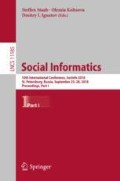Abstract
By what means do social media contribute to social movements? This question has been studied for decades, but rarely from the collective sense-making perspective. When a particular crying out for social change is taking place, people nowadays begin to talk on social media platforms. We examined the focuses of people’s talking in a protesting context where multiple protesting tactics were involved including both online and offline activism. By analyzing Twitter messages during Ferguson unrest in August 2014, we revealed two distinct types of online conversations: one discusses offline protests concerning more immediate happenings; the other goes beyond involving meaning-making to diagnose and digest the disorienting thoughts and feelings. To characterize the discussions, we developed two coding schemes, first to differentiate the discussion of offline protests from others, and second to differentiate ways of meaning-making. This study is the first attempt to identify the challenges of differentiating tweets consisting of street protest information, and the developed coding scheme, together with machine classification, can be applied to identifying tweets consisting of street protest information. We observed that while mainstream media often focused on what happened on street, during Ferguson protests, only one out of every 4.5 tweets focused on offline activities. Our study offers evidence for considering social media’s significance from an alternative perspective – the media are not simply the witness or facilitator of offline protests, but leave traces that afford to study collective mind activities and changes such as meaning contesting and perspective shifting that are essential for social change.
Access this chapter
Tax calculation will be finalised at checkout
Purchases are for personal use only
References
de Albornoz, J.C., Plaza, L., Gervás, P.: Sentisense: an easily scalable concept-based affective lexicon for sentiment analysis. In: LREC, pp. 3562–3567 (2012)
Bastos, M.T., Mercea, D., Charpentier, A.: Tents, tweets, and events: the interplay between ongoing protests and social media. J. Commun. 65(2), 320–350 (2015)
Bonilla, Y., Rosa, J.: # ferguson: digital protest, hashtag ethnography, and the racial politics of social media in the united states. Am. Ethnol. 42(1), 4–17 (2015)
Casciani, D.: How social media changed protest. http://www.bbc.com/news/magazine-11953186. Accessed 10 May 2018
Castells, M.: Networks of Outrage and Hope: Social Movements in the Internet Age. Wiley, Chichester (2015)
Chung, C., Pennebaker, J.W.: The Psychological Functions of Function Words. Social Communication, pp. 343–359 (2007)
Conover, M.D., Davis, C., Ferrara, E., McKelvey, K., Menczer, F., Flammini, A.: The geospatial characteristics of a social movement communication network. PloS one 8(3), e55957 (2013)
De Choudhury, M., Jhaver, S., Sugar, B., Weber, I.: Social media participation in an activist movement for racial equality. In: ICWSM (2016)
Freelon, D., McIlwain, C.D., Clark, M.D.: Beyond the hashtags:# ferguson,# blacklivesmatter, and the online struggle for offline justice (2016)
Gallagher, R.J., Reagan, A.J., Danforth, C.M., Dodds, P.S.: Divergent discourse between protests and counter-protests:# blacklivesmatter and# alllivesmatter. arXiv preprint arXiv:1606.06820 (2016)
Glasberg, D.S., Shannon, D.: Political Sociology: Oppression, Resistance, and the State. SAGE Publications, London (2010)
González-Bailón, S.: The dynamics of protest recruitment through an online network. Sci. Rep. 1, 197 (2011)
Goodwin, J., Jasper, J.M.: The Social Movements Reader: Cases and Concepts. Wiley, New York (2014)
Graham, J., Haidt, J., Nosek, B.A.: Liberals and conservatives rely on different sets of moral foundations. J. Pers. Soc. Psychol. 96(5), 1029 (2009)
Hanna, A.: MPEDS: automating the generation of protest event data (2017)
Heller, N.: Is there any point to protesting? https://www.newyorker.com/magazine/2017/08/21/is-there-any-point-to-protesting. Accessed 10 May 2018
Klandermans, B., van Stekelenburg, J.: The political psychology of protest. Eur. Psychol. 18(4), 224–234 (2013)
McAdam, D., McCarthy, J.D., Olzak, S., Soule, S.A.: Dynamics of collective action (2009)
Mikolov, T., Sutskever, I., Chen, K., Corrado, G.S., Dean, J.: Distributed representations of words and phrases and their compositionality. In: Advances in Neural Information Processing Systems, pp. 3111–3119 (2013)
Park, C.L.: Making sense of the meaning literature: an integrative review of meaning making and its effects on adjustment to stressful life events. Psychol. Bull. 136(2), 257 (2010)
Thorpe, J.: Do political protests actually change anything? https://www.bustle.com/p/do-political-protests-actually-change-anything-29952. Accessed 10 May 2018
Tufekci, Z.: Twitter and Tear Gas: The Power and Fragility of Networked Protest. Yale University Press, New Haven (2017)
Valenzuela, S.: Unpacking the use of social media for protest behavior: the roles of information, opinion expression, and activism. Am. Behav. Sci. 57(7), 920–942 (2013)
Van Stekelenburg, J., Klandermans, B.: The social psychology of protest. Curr. Sociol. 61(5–6), 886–905 (2013)
Yang, G.: Narrative agency in hashtag activism: the case of #blacklivesmatter. Media Commun. 4(4), 13 (2016)
Acknowledgement
The authors thank Joshua Bloom for his insight in the early stage of this research. The authors would like to acknowledge the support from NSF #1634944. Any opinions, findings, and conclusions or recommendations expressed in this material do not necessarily reflect the views of the funding sources.
Author information
Authors and Affiliations
Corresponding author
Editor information
Editors and Affiliations
Rights and permissions
Copyright information
© 2018 Springer Nature Switzerland AG
About this paper
Cite this paper
Chung, WT., Lin, YR., Li, A., Ertugrul, A.M., Yan, M. (2018). March with and Without Feet: The Talking About Protests and Beyond. In: Staab, S., Koltsova, O., Ignatov, D. (eds) Social Informatics. SocInfo 2018. Lecture Notes in Computer Science(), vol 11185. Springer, Cham. https://doi.org/10.1007/978-3-030-01129-1_9
Download citation
DOI: https://doi.org/10.1007/978-3-030-01129-1_9
Published:
Publisher Name: Springer, Cham
Print ISBN: 978-3-030-01128-4
Online ISBN: 978-3-030-01129-1
eBook Packages: Computer ScienceComputer Science (R0)

